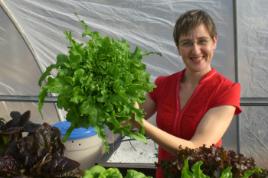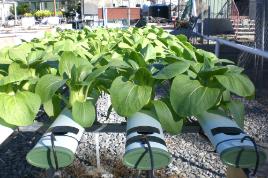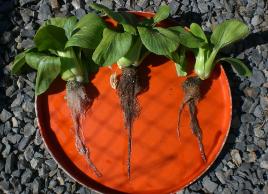Super worm farms could make growing vegies on skyscrapers possible
Published on 07 September, 2011
A scoping study by the Rural Industries Research and Development Corporation (RIRDC) has found that food waste from restaurants and commercial kitchens could be used to grow fresh vegetables in both high density urban environments and remote rural areas with poor soil and low rainfall. The study has drawn on work by CQUniversity researchers.
CQUniversity's involvement has been led by Professor David Midmore, Adjunct Research Fellow Dr Brett Roe and Masters graduate Elena Churilova.

Elena Churilova worked on the worm farm project while completing her Masters at CQUniversity
The process of turning waste organic product into nutrient-rich liquid is dependent on worms. The worms would be fed food scraps as part of specially made ‘vermiculture' systems. Vermiculture is the process by which worms take plant and animal material and effectively turn it into a nutrient rich ‘juice' that can then be used to grow plants.
The ‘worm juice' produced from the food scraps would then be used in specially developed hydroponics systems that could be set up on urban high-rise rooftops or in remote regional settlements, such as mining sites.
RIRDC Managing Director, Craig Burns said the process had numerous environmental, social and economic benefits.
"The idea is almost like ‘supercharging' the humble compost bin by using worms to produce highly fertile liquid and then using that in water efficient hydroponic systems that can be used to grow plants almost anywhere," Mr Burns said.
"The most obvious benefit of a system like this is environmental. Utilising urban organic waste to produce a clean, nutritious food product adds value to something that would otherwise have ended up in landfill. Then there is the aspect of growing food closer to home, saving on transport, manufacturing and storage costs.
"In the case of high-density urban environments previously unused spaces, like high-rise rooftops, could be utilised to produce cheap, fresh food."
"Residential communities in high density urban areas could benefit from having access to these unique community gardens through turning barren un-used areas into more aesthetically pleasing green spaces."
The study also found that the vermiculture system could work as a source of food for fish.
Although the vermiculture and hydroponic technologies and systems already exist, the scoping study concluded that the combined systems are several years away from being adopted on a large scale.
Issues such as collecting the organic waste and distributing it to individual vermiculture and hydroponic set-ups were some potential stumbling blocks that would require a solution. However, there was a commercial opportunity for waste companies or entrepreneurs to develop such organic waste distribution and vermiculture/hydroponic networks.



